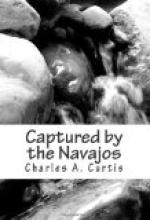Ascending a swell in the surface of the ground we saw that all the buildings had disappeared, nothing meeting our anxious gaze but beds of lurid coals, occasionally fanned into a red glow by the intermittent night breeze. But there was the impregnable earthwork; the family must be in that. I dashed swiftly forward, eagerly followed by my men. The earthwork was destroyed, nothing but a circular pit remaining, in the bottom of which glowed the embers of the fallen roof-timbers.
A search for the slain was at once begun, and continued for a long time. Every square rod of the valley for a mile was hunted over without result, and we all gathered once more about the two cellars, in which the coals still glowed.
“It was in the cellar of the house that Sergeant Henry said the body of Mrs. Arnold was laid, was it not?” asked Dr. Coues.
“Yes,” I replied.
“Then if all were killed after he left—shot from time to time—would not their remains be likely to be beside hers?”
“Not beside hers, I think. The last stand must have been made in the fort.”
“Then the bodies, or what is left of them, must lie under that circular bed of coals, Duncan, if they died here.”
“Probably, doctor. It’s an uncanny thing to do, but we must stir the coals and see.”
A thorough search revealed nothing.
“Does th’ liftinint moind that Sargint Hinery mintioned a covered way that led from th’ cellar to th’ spring?” asked Private Tom Clary, who wielded a rail beside me. “Perhaps th’ pretty lassie and her frinds are in that.”
“That is so, Clary; thank you for the suggestion,” I answered. “Can you make out the opening?”
“Nothin’ sure, sor. Behoind thim wagon-tires there sames to be a natural slope of earth.”
“Tip the tires over, Clary,” I ordered; and presently a number of tires, from which the fire had burned the felloes, spokes, and hubs, fell into the coals, disclosing a recently filled aperture.
“Looks as if the end of a passage had been filled, doesn’t it?” asked the surgeon.
“It certainly does,” I answered. “Let us go to the spring and examine.”
Accompanied by the doctor and several men, I rode to the spring. When we arrived there we broke a way through the thick-set willows into an irregular mass of small bowlders. Climbing over these, we found ourselves at the mouth of a narrow passage about four feet high and two feet wide.
“This must be the entrance to the covered way,” I remarked, and placing my head in the crevice, I called: “Oh, Mr. Arnold, we are here—your friends from Fort Whipple!”
“Thank Heaven!” in a man’s tones, came clearly through the entrance, accompanied by a sudden outburst of sobs in girlish voices.
“We’ll be there directly,” spoke another man’s voice—that of a stranger. “We’ve heard your horses’ hoofs jarring the ground for some time, but we thought it safest to lay low until we were sure it wasn’t redskins.”




